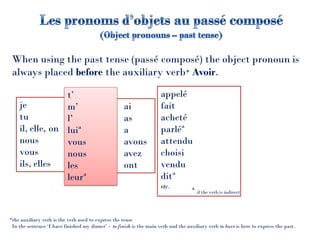Signaler
Partager
Télécharger pour lire hors ligne

Recommandé
Recommandé
Estudo de Caso de uma Estrutura de Autenticação Única utilizando o protocolo ...

Estudo de Caso de uma Estrutura de Autenticação Única utilizando o protocolo ...Fernando Geraldo Mantoan
Contenu connexe
Tendances
Estudo de Caso de uma Estrutura de Autenticação Única utilizando o protocolo ...

Estudo de Caso de uma Estrutura de Autenticação Única utilizando o protocolo ...Fernando Geraldo Mantoan
Tendances (20)
Estudo de Caso de uma Estrutura de Autenticação Única utilizando o protocolo ...

Estudo de Caso de uma Estrutura de Autenticação Única utilizando o protocolo ...
Colocação pronominal - guia completo e definitivo

Colocação pronominal - guia completo e definitivo
En vedette (20)
Passe Compose with Etre (Dr. and Mrs. P Vandertramp)

Passe Compose with Etre (Dr. and Mrs. P Vandertramp)
Similaire à French object pronouns (past)
Similaire à French object pronouns (past) (20)
PRESENT_PERFECT.pptxssssssssssssssssssssssssssssssssssssssssss

PRESENT_PERFECT.pptxssssssssssssssssssssssssssssssssssssssssss
Plus de Apprenons Woodley
Plus de Apprenons Woodley (20)
French object pronouns (past)
- 1. ai as a avons avez ont je tu il, elle, on nous vous ils, elles When using the past tense (passé composé) the object pronoun is always placed before the auxiliary verb* Avoir. *the auxiliary verb is the verb used to express the tense In the sentence ‘I have finished my dinner’ - to finish is the main verb and the auxiliary verb to have is here to express the past. t’ m’ l’ luiª vous nous les leurª appelé fait acheté parléª attendu choisi vendu ditª etc. ª if the verb is indirect
- 2. ai pas as pas a pas avons pas avez pas ont pas je tu il, elle, on nous vous ils, elles and in the negative form.... ne t’ ne m’ ne l’ ne luiª ne vous ne nous ne les ne leurª appelé fait acheté parléª attendu choisi vendu ditª etc. ª if the verb is indirect
- 3. À vous maintenant... You are now ready for exercises of Level 5 and 6 of this course. These exercises focus on placing the object pronouns before the auxiliary verb. In these 2 exercises, you must type in the missing words: Bonne leçon! je xx parlé (you – inf.) you must type in je xx pas appelé (you – inf.) you must type in eg. t’ai ne t’ai
